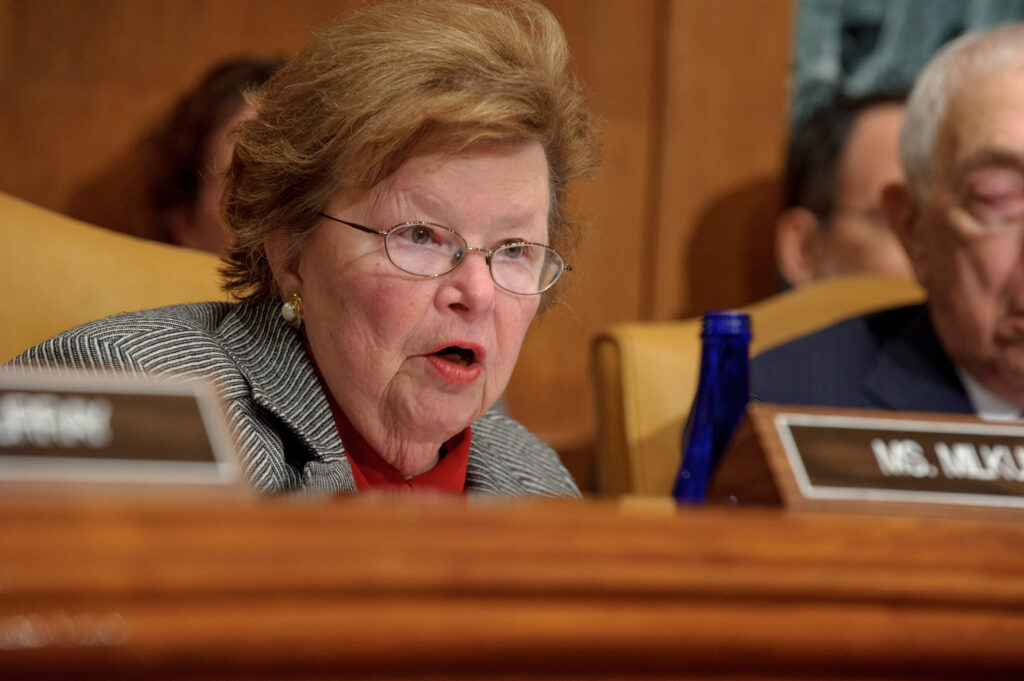SAC To Budgeteers: Stop Sequestration, Avoid Another Shutdown
Posted on

Maryland Democrat Barbara Mikulski, chair of the Senate Appropriations Committee.
CAPITOL HILL: “That’s a real softball question, so I’ll try to knock it out of the park,” the witness told the senator.
There’s a scripted quality to many legislative hearings, but it’s rare to hear the actors break character and admit they’re in a play. The exchange above actually happened, between Rockford, Ill. mayor Larry Morrissey and Illinois Senator Dick Durbin, chairman of the Senate Appropriations defense subcommittee, at a hearing today on the impact of the automatic budget cuts known as sequestration. Can you guess the mayor’s answer? Very bad.
But the substance wasn’t the point: It was the timing. The chairwoman of the full appropriations committee, Sen. Barbara Mikulski, made clear at the hearing’s start that she wanted to pressure the Budget Conference Committee — created as part of the government shutdown solution — to dial back sequestration. The committee was meeting today.
“We are just shocked at what we lived through with the last sequester and the shutdown. I want to do everything I can, as the chair of this committee, working with Sen. Shelby, to enable the budget committee to come up with a plan to cancel sequester for two years,” Mikulski said, literally pounding on the table. (Richard Shelby is the ranking Republican on the full committee. Unlike Mikulski, Shelby doesn’t sit on the defense subcommittee). “My goal would be that in January, when we vote, we would be voting on an omnibus, you would know what it is for the year, and that we would have cancelled sequester.”
Speaking just after Mikulski, Maine Republican Susan Collins made the timing issue explicit: “With the commencement of the budget negotiations finally occurring between the House and the Senate, now is the time to end sequestration,” said Collins, a moderate and strongly pro-defense Republican with no time for Tea Party “just cut everything” attitudes. Collins went on to praise Mikulski “for getting us to crank out the appropriations bills. She’s kept the pressure on to return to regular order.”
Note Collins’ reference to “regular order” and Mikulski’s call for a full-year omnibus appropriations bill. What they’re saying is that, if Congress can’t reach a compromise to cancel, delay, or somehow soften the sequester – and so far the political odds look grim – at least it should approve the funding the federal government needs to function for the rest of the fiscal year (which began October 1st), instead of staggering through with one Continuing Resolution after another.
After that serious political positioning, the rest of the hearing was softball to the point of comedy. Senators and witnesses alike stuck to the same anti-sequestration arguments – all valid – that we’ve been hearing for at least 16 months: the automatic budget cuts are blind and mindless, they undermine our military, they hurt big defense contractors and kill some of the sector’s most innovative small business outright, they drive irreplaceable skilled workers out of the defense industry, and they create ripple effects of unemployment throughout communities, like Morrissey’s Rockford, that depend heavily on military spending.
The witnesses were a well-balanced group: the heads of two powerful business groups, the National Defense Industrial Association and the Aerospace Industries Association, spoke to the big picture; two small businessmen and Mayor Morrissey spoke to the hometown impact; a representative of the International Association of Machinists and Aerospace Workers (IAM) spoke for labor; and there was one academic.
That academic was the Aerospace Industries Association’s favorite economist, Stephen Fuller. The George Mason professor once calculated the full 10-year, trillion-dollar sequester would cost two million jobs, a figure AIA has made major efforts to publicize. Today Fuller spent his time defending his revised estimate of 1.5 million. “People keep asking me, where are those job losses?” he told the committee. “[They’re] not quite as large as I was suggesting — yet.”
Unemployment has in fact been dropping since early 2010, at a steady rate apparently uninterrupted by the sequester, the government shutdown, or the danger of a federal default, but Fuller argued that if sequestration had not happened, “the economy could’ve done much better.” As time goes on, he warned, “the jobs not added are going to become more numerous.”
How to calculate the complex economic impacts of sequestration might have been an interesting and substantive debate, but no one was in the mood for such a thing today. More typical were the remarks of Alaska Republican Lisa Murkowski, who spent half her time talking about how she had prevented cuts at her homestate’s Eielson Air Force Base before asking the panel to confirm that sequestration was, in fact, very bad.
There was a pause as each of the six witnesses waited for one of the others to answer.
Then Murkowski called on Mayor Morrissey: “You’re the one that said you could hit it out of the park with a softball,” she said, “and that was clearly a softball.” Nothing solved, but messages sent.
Subscribe to our newsletter
Promotions, new products and sales. Directly to your inbox.
